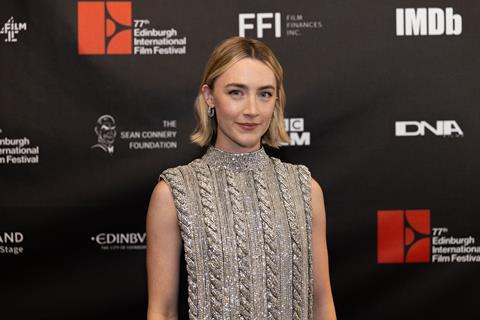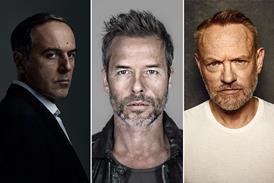
There was a palpable sense of relief surging through EIFF as it made its first fully-fledged return following a tough few years with the collapse of former parent charity the Centre for the Moving Image in 2022 threatening the future of one of the world’s longest-running festivals.
At a BBC Film drinks reception on the festival’s second night, the film funder’s director Eva Yates recalled standing on the same stage the previous year during programmer Kate Taylor’s scaled-back edition, with no one quite sure what the future held.
The consensus among the industry present in Edinburgh was festival director Paul Ridd and festival producer Emma Boa had generally pulled it off, despite a shaky start, signalled by an opening ceremony that started an hour late. But the event eventually found its sea legs and there’s a sense EIFF redux is a work-in-progress with a positive future.
Lizzie Francke, a previous EIFF director, now head of the directing fiction department at the NFTS, commended Ridd and Boa for their “energetically rebooted” edition, one that tipped its hat to the legacy of EIFF as Bafta Scotland presented a lifetime achievement to former festival director Lynda Myles during the festival.
“Long may it run,” Francke added.
The speakers at the industry events featured some big draws, including WME Independent co-chair Alex Walton, a packed-out in-conversation event between Alex Garland and his long-time producer collaborator and EIFF chair Andrew Macdonald, plus a last-minute appearance from Scottish actor Brian Cox.
Many of the great and the good from the London-based UK industry made the trip to Edinburgh, including BFI Filmmaking Fund director Mia Bays, BBC Film’s Yates, Picturehouse managing director Clare Binns, former BFI London Film Festival director and now Berlinale festival director Tricia Tuttle, BFI executive director of public programmes and audiences Jason Wood, Film4 development and production executive Alice Whittemore, Mister Smith Entertainment’s Emma Mason, former Protagonist Pictures executive Len Rowles (now at Climate Spring), We Are Parable founders Teanne and Anthony Andrews, and Reclaim The Frame director Melanie Iredale.
A talking point for many delegates this year was the use of Fringe venues for screenings and events which received mixed feedback. Some were happy to see the festival move out of the Vue and Everyman cinemas that housed last year’s festival to build a sense of fluidity and camaraderie with the Edinburgh Fringe alongside the venerable Cameo Picturehouse hub. Others lamented a lack of proper seating at some sites and spaces that didn’t feel professional enough as sites for festival screenings, including university department buildings.
This year’s festival also suffered from the absence of a decent central meeting point. The Cameo Picturehouse was too small to work as an effective social linchpin. The rebooting of former EIFF hub the Edinburgh Filmhouse, which is forecast to reopen next spring, could solve this problem should it work out a partnership with the festival.
It also remains to be seen how the relationship between the festival and the Scotland-based film industry will evolve, with many of the faces at the invite-only industry events over the weekend familiar ones from London.
Ridd, who moved from London to Edinburgh for the job, has made it clear he wants the festival to have an international focus, akin to Sundance. He is supported by festival producer and longstanding EIFF employee Emma Boa, and Scotland-born chair and vice-chair Macdonald and producer Amy Jackson.
This year’s programme spoke to Ridd’s international outlook with three out of the 10 world premieres in the competition strand from the UK, including the winner of the inaugural Sean Connery £50,000 filmmaking prize, Jack King’s The Ceremony.
None of the competition titles were from Scotland-based directors, although the opening and closing films were more local offerings, with Sundance and Berlinale title The Outrun, which shot in Orkney, kicking things off, and music doc Since Yesterday: The Untold Story Of Scotland’s Girl Bands closing this year’s EIFF.
EIFF is back in business, and the industry will be watching closely to see where it goes next.

























No comments yet